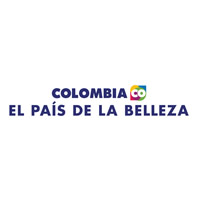Hay Festival Cartagena 2023
Welcome to the Hay Festival Cartagena de Indias 2023 programme, to be held from 26 to 29 January. In this page you can find the events in the general programme as well as Hay Joven activities tor university audiences, Hay Comunitario sessions which will take place in different areas of Cartagena, Reading Clubs and Talento Editorial.
The tickets of the general programme and reading clubs are on sale for in person events. If you wish to register to see the live streaming of events, please select the option "Register to watch online" when this option is available. Hay Joven, Hay Comunitario and Talento Editorial are 100% in person and free of charge.
If you have any issues regarding the payment of your tickets, please contact us at tickets@hayfestival.org or at +57 317 516 55 13.
If you are a students a wish to request free tickets, you can write to us at estudiantes@hayfestival.com.
If you have any general questions, you can find us at contacto@hayfestival.org.
Event HC3
'Letras al carbón' and other stories by Irene Vasco
Reading and conversation on some of her books
La Canoa Literaria
Read more
Event 2
Jorge Franco in conversation with Juan Manuel Ruiz
Centro de Convenciones (Auditorio Getsemaní)
Read moreJorge Franco, author of the contemporary classic of Colombian literature Rosario Tijeras, and winner of the reputed Alfaguara Novel Prize for El mundo de afuera, presents his most recent work, El vacío en el que flotas. The explosion of a bomb sparks off this story in which a child disappears, and a plot unfolds in three apparently independent narratives, threads which eventually interconnect in an unexpected and dramatic way. He will talk to Juan Manuel Ruiz.
Supported by RCN and Postobón
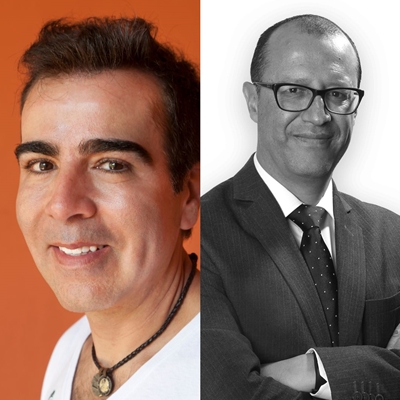
Event HJ4
Eduardo Romero García in conversation with Esteban Vega Bedoya
Universidad de Cartagena, Claustro de la Merced (Salón Eréndira)
Read moreWith the support of Acción Cultural Española (AC/E)
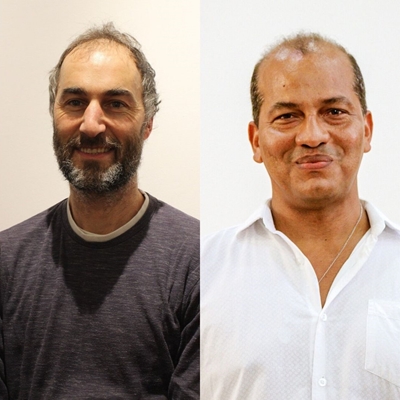
Event TE1
Felipe González, Marisol Schulz and Silvia Sesé in conversation with Guido Tamayo
Women in Latin American literature
Centro de Formación de la Cooperación Española (Salón Mutis)
Read moreWith the support of AECID
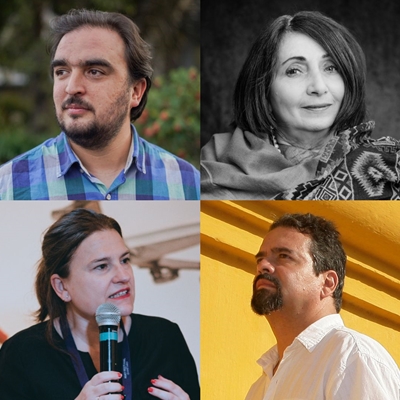
Event TE2
Dejanira Álvarez Cárdenas and Andrea Montejo in conversation with Nubia Macías
Reading in Spanish: the Feria Internacional del Libro de Nueva York
Centro de Formación de la Cooperación Española (Salón Mutis)
Read moreThe Feria Internacional del Libro de Nueva York is becoming a flagship event for the Latino book in the United States. We will talk about its present and its future. Featuring Dejanira Álvarez Cárdenas, Director of the Feria Internacional del Libro de Nueva York; and Andrea Montejo, Director of Indent Literary Agency. Moderated by Nubia Macías, General Manager of NM Consultora, Mexico City (Mexico).
With the support of AECID

Event 11B
Héctor Abad Faciolince, Volodymyr Yermolenko and José Manuel Cajigas in conversation with Catalina Gómez Ángel
Celebrating Victoria Amelina: Dom's Dream Kingdom
Teatro Adolfo Mejía
Read moreOn June 27th, a Russian missile struck the Ria pizzeria in the Ukrainian city of Kramatorsk, leading to the death of the war crimes researcher and writer Victoria Amelina (Ukraine). Her tragic demise coincided with the release of the Spanish version of her book Dom's Dream Kingdom ('Un hogar para Dom'), published by Avizor with a prologue by Hector Abad Faciolince —sadly, a moment she never got to witness. This novel, depicting the lives of three generations of a family led by an old Soviet pilot and war veteran settled in Lviv, a city that was once one of Europe's major cultural centers, had established Amelina as one of the finest Ukrainian writers of the new generation. Héctor Abad Faciolince, Volodymyr Yermolenko, Avizor's editor José Manuel Cajigas, and journalist Catalina Gómez Ángel, a friend of the author, will discuss this book.
Volodymyr Yermolenko will participate in this event digitally.
Simultaneous translation from English to Spanish will be provided
With the support of Open Society Foundations

Event 13
Javier Moro in conversation with Moisés Naím
Centro de Convenciones (Auditorio Getsemaní)
Read moreThis celebrated Spanish author will talk to Moisés Naím about his most recent books. Javier Moro, one of the bestselling Spanish-language writers, is also a journalist and has worked as a screenwriter and film producer in Hollywood. His books include Senderos de libertad (1992), El pie de Jaipur (1995), Las montañas de Buda (1997), Five Past Midnight In Bhopal (2001, a work written together with Dominique Lapierre), Passion India, The Red Sari, El imperio eres tú (2011 Planeta Prize) and, more recently Nos quieren muertos, which the author will talk about at this event. This book, which is both an exciting read and a rigorous study, is about a key figure for understanding contemporary Venezuela: Leopoldo López. Upon being jailed in 2014, after leading massive protests against the Maduro government, López became a symbol of the struggle for democracy in the country.
Sponsored by Promigas

Event 14
In Koli Jean Bofane and Adania Shibli in conversation with Jon Lee Anderson
South to South conversations: literature and freedom of expression
Centro de Convenciones (Salón Barahona)
Read moreThe space available for writing should always be a safe place for the artist, but are there external limitations on the imaginations of writers? Jon Lee Anderson will talk to the Congolese writer In Koli Jean Bofane, author of Mathématiques Congolaises, and the Palestinian writer Adania Shibli, author of Minor Detail, about their experiences as creators, their perspective with regard to freedom of expression, and how this has affected their work.
Simultaneous translation from English to Spanish available
With the support of Open Society Foundations
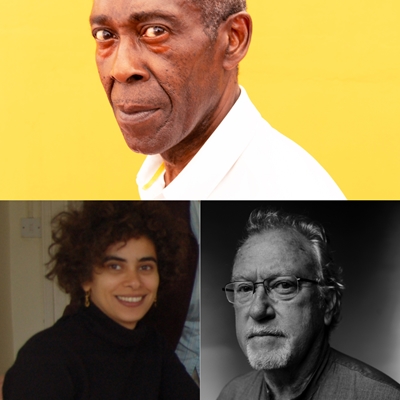
Event 17
Jorge Comensal and Eduardo Romero García in conversation with Daniella Sánchez Russo
Centro de Formación de la Cooperación Española (Salón del Rey)
Read moreWith the support of Acción Cultural Española (AC/E)
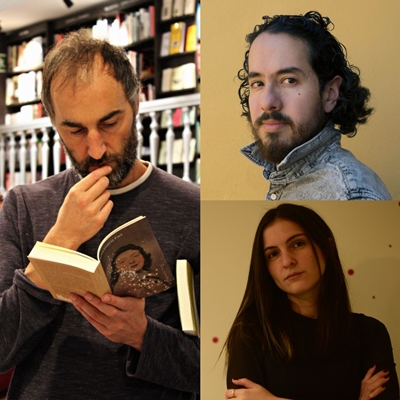
Event HJ8
Ana Paula Maia y Fernanda Trías en conversación con Willian Malkún Castillejo
Shared truths
Universidad de Cartagena, Claustro de San Agustín (Aula Máxima de Derecho)
Read moreThe Hay Festival and the International Center for Transitional Justice (ICTJ) present the anthology Verdades compartidas, a project that reimagines Colombia after the peace process, written by ten Latin American authors. The project presents an inclusive and holistic vision of the peace process, and portrays not only the diversity of the country, but also sets the nation within the Latin American context. Three contributors to the anthology, Ana Paula Maia (Brazil) and Fernanda Trías (Uruguay) will talk about their texts, perspectives and feelings. In conversation with the Rector of Cartagena University, Willian Malkún Castillejo.
Simultaneous translation from Portuguese to Spanish available
With the support of The International Center for Transitional Justice (ICTJ) and the Swedish Embassy in Colombia

Event CL1
Book club: Jorge Franco in conversation with Ana María Aponte
Casa Hay (Centro de Convenciones)
Read moreThe book should be read before attending.
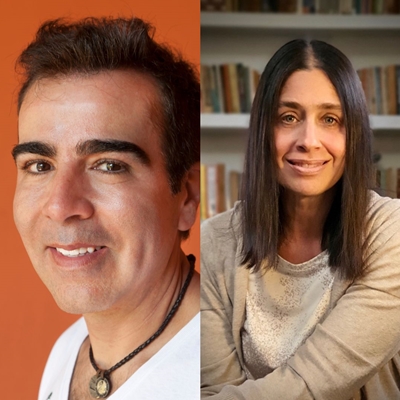
Event TE3
Margarita Valencia and Paula Andrea Marín in conversation with Paco Goyanes
Presentation of the book 'Oficio libros: historias de libreras and libreros de Colombia'
Centro de Formación de la Cooperación Española (Salón Mutis)
Read moreWith the support of AECID
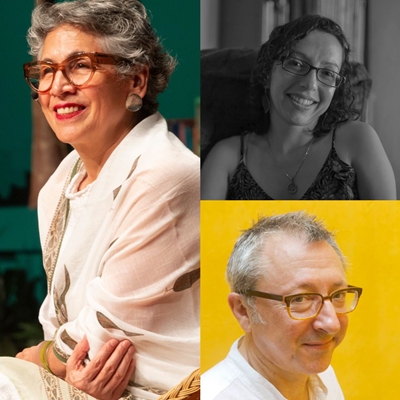
Event 18
Juan Gabriel Vásquez in conversation with Ana Bejarano
Centro de Convenciones (Auditorio Getsemaní)
Read moreThe award-winning Colombian writer of both fiction and non-fiction, Juan Gabriel Vásquez, whose bibliography contains 17 books including novels, short stories, essays and poetry published in 30 languages, is one of the country’s most prolific and renowned writers. In his most recent book, La traducción del mundo, Vásquez presents the talks he gave at Oxford University in 2022, when he was invited to give the prestigious Weidenfeld Lectures, a series that has previously featured speakers such as Mario Vargas Llosa, Umberto Eco and Javier Cercas. With his habitual erudition, Vásquez gives his vision of literature, particularly fiction, as the highest tool we have for investigating the vastness and essence of human experience. In conversation with Ana Bejarano.
Sponsored by Promigas
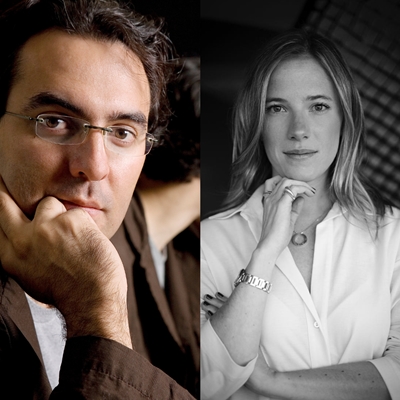
Event 21
Margarita Rosa de Francisco in conversation with Vanessa Rosales
Centro de Formación de la Cooperación Española (patio)
Read moreOver the course of four decades, and with 15 years as a columnist, Margarita Rosa de Francisco has become one of the most entertaining and influential personalities in the Colombian media. Her roles in soap operas such as Gallito Ramírez (1986-87) and Café con aroma de mujer (1994-95) made her a star of national television. She has acted in around 20 film and television productions, has contributed to media outlets such as El Tiempo, SoHo, Ellas and El Espectador, and has won many prizes, including the Simón Bolívar, TV y Novelas, Macondo and the India Catalina awards in Colombia, as well as the recent Horizon Award at the 2023 Venice Film Festival for Best Actress in the film El Paraiso, directed by the Italian Enrico María Artale. She will talk to Vanessa Rosales about her second book, Margarita va sola (2023), a collection of memories and reflections on matters that range from revealing one’s body and erotic initiation, to her thoughts about God and identity.
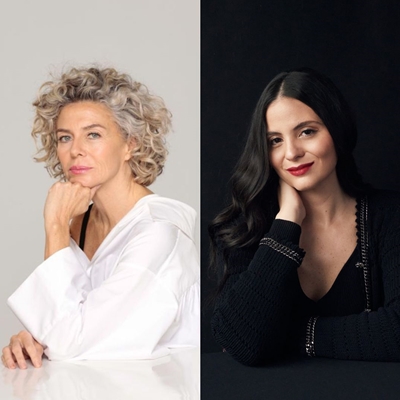
Event HJ10
Carlos Manuel Álvarez, Nona Fernández, Natalia García Freire in conversation Pablo Abitbol
Shared truths
Universidad Tecnológica de Bolívar (Sede Manga) - Auditorio Jorge Taua
Read moreWith the support of the International Center for Transitional Justice (ICTJ) and the Swedish Embassy in Colombia
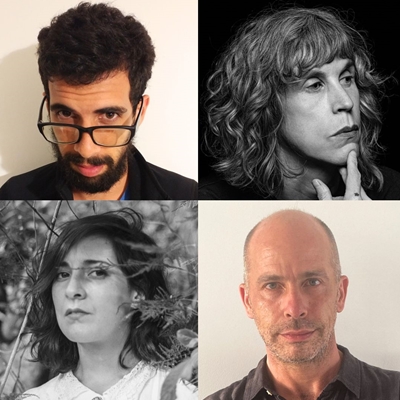
Event CL2
Book club: Julia Navarro in conversation with Margarita Valencia
Casa Hay (Centro de Convenciones)
Read moreThe book should be read before attending.

Event 24
Jago Cooper in conversation with Laura Osorio Sunnucks
Visionary art
Centro de Convenciones (Salón Barahona)
Read moreMuseum director and curator, documentary presenter and Professor of Art and Archaeology, Jago Cooper (UK) will talk about his new and radical vision of art. Drawing on his adventures in Latin America as well as his long standing work with human creativity - from Indigenous Caribbean cave painting to contemporary activist installations tackling issues such as the climate crisis - he will discuss the meaning of art and why the museums that care for it are magical. In conversation with Laura Osorio Sunnucks.
Simultaneous translation from English to Spanish available
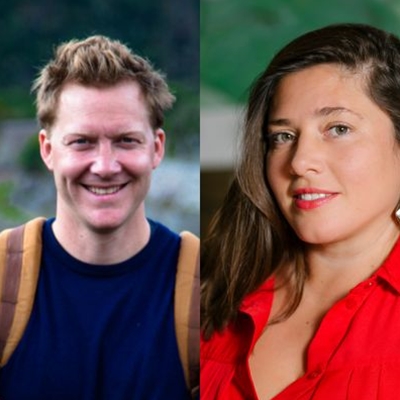
Event 25
Hisham Matar in conversation with Philippe Sands and Juan Gabriel Vásquez
Teatro Adolfo Mejía
Read moreThe acclaimed author Hisham Matar (Libya/United States), winner of the Pulitzer Prize for The Return, presents his new book, My Friends, a highly moving novel about three friends who experience political exile and about the emotional homeland that close friendships can create, in conversation with Juan Gabriel Vásquez and Philippe Sands.
Simultaneous translation from English to Spanish available
Supported by Promigas
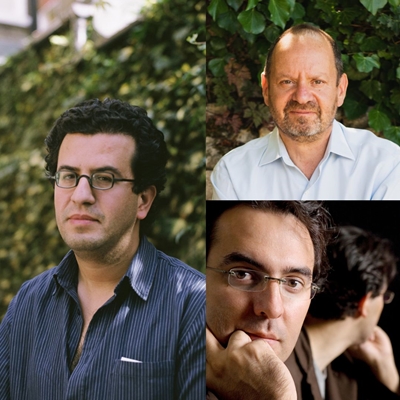
Event 27
Gabi Martínez in conversation with David Lara Ramos
Centro de Formación de la Cooperación Española (Salón del Rey)
Read moreThe writer and environmental activist Gabi Martínez (Spain) is the author of sixteen books, including novels and non-fiction, translated into over ten languages. He is also the Director of the Liternatura Festival, won the 2022 Serondaya Prize and is the co-director of the Animales Invisibles project. He will talk to us about Delta, a text written over the course of a year spent in the last house before the sea at the delta of the Ebro river, in which he bears witness to the growing tensions between humans and nature. In conversation with David Lara Ramos.
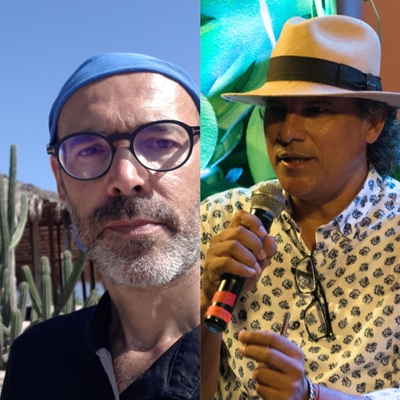
Event HJ12
Gabriela Cabezón Cámara in conversation with Deiver Juez Correa
Universidad de Cartagena, Claustro de San Agustín (Biblioteca)
Read more
Explore All Genres
- Afrodescendencias
- Latin America
- South to South
- Art
- Arts & Culture
- Children
- Classics
- Crime
- Culture
- Drawing
- Economics
- Equality
- Film
- Gender
- Health
- Heritage
- History
- Human Rights
- Indigenous Cultures
- Journalism
- Life
- Literature
- Lviv BookForum
- Medicine
- Memoir
- Music
- Nature & Environment
- Philosophy
- Politics
- Psychology
- Science
- Thinking
- World Affairs
- Young Adult





